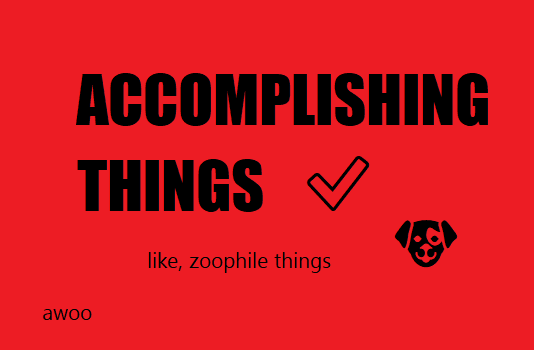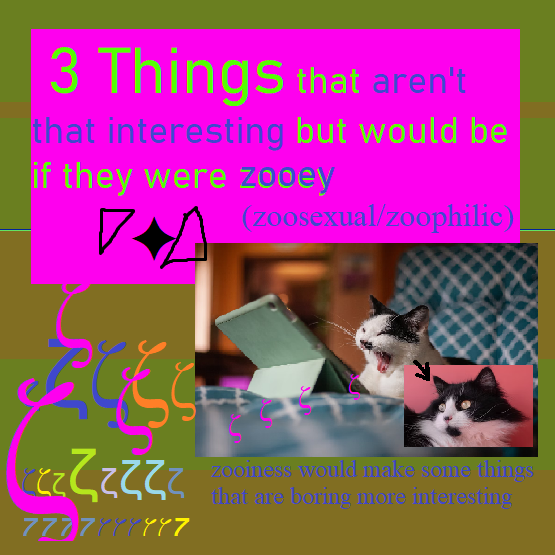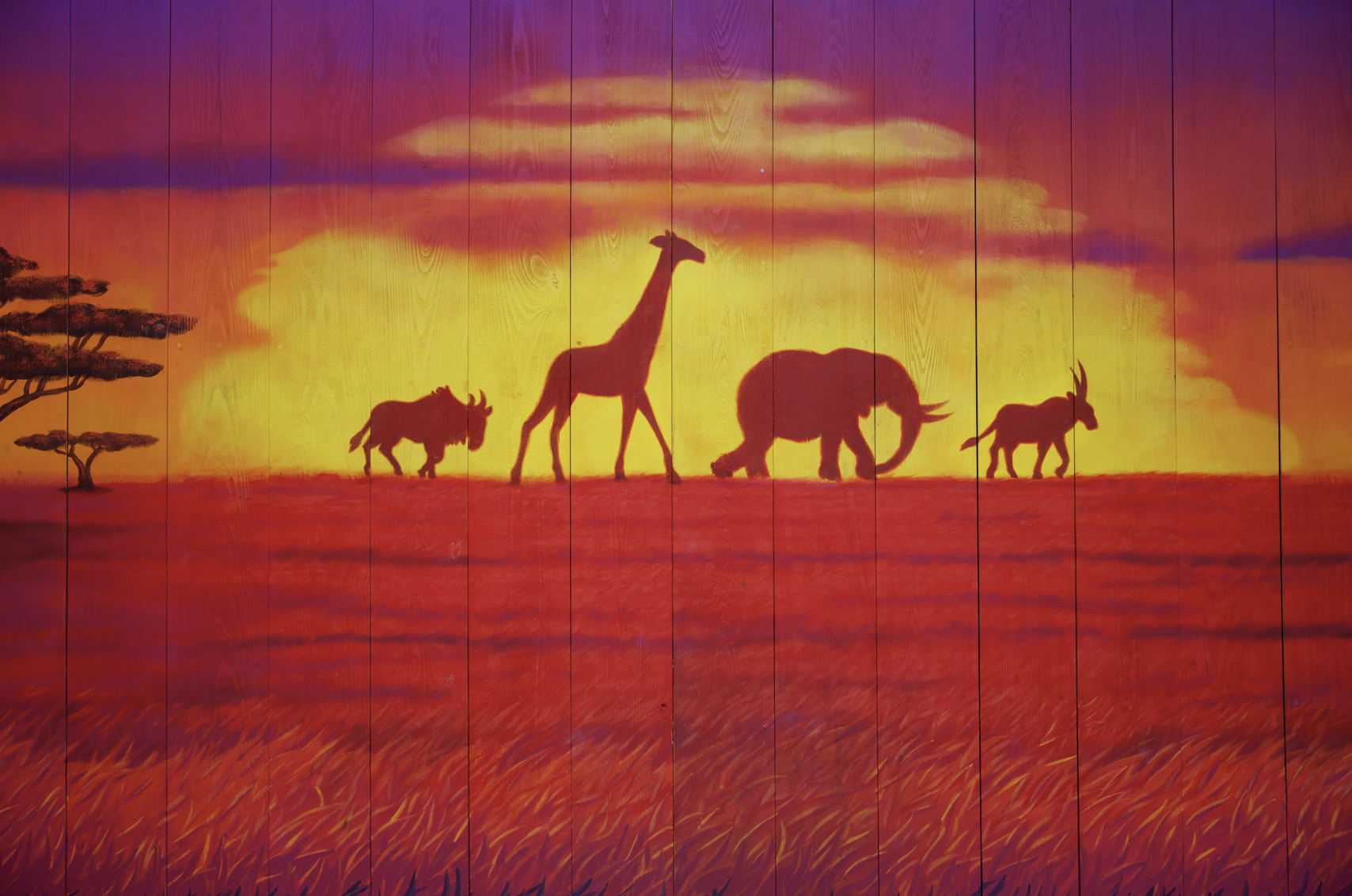Accomplishing Things

There's a criticism that we here at the magazine, and I think really all zoo activism gets that I wanted to talk about today. And that's that we're not really accomplishing things. That all we really do is make our little podcasts and write our silly articles, and make some tweets that stir up controversy now and then. I've heard this from both zoos and non-zoos alike. The line is typically that if we really cared and believed in our cause, we should have no problem posting our name and face online. But the fact that we don't proves us to be cowards who aren't willing to actually stand behind our beliefs.
And I want to take a moment, or an article anyway, to talk about the ways that I think that criticism is wrong, but also the ways that it's right. Because while I disagree with the conclusion, I think the logic they're using is solid. To a degree anyway.
First of all, let's talk about the internet. It's easy to forget that a few decades ago, the idea of being connected to everyone else on the planet was barely even conceptually imagined. The internet has totally changed the ways in which we're able to communicate with not just other people, but society at large. And this connection has fundamentally changed society's way of handling activism.
Let's look at the example of gay rights. A lot of the gay rights movement happened in a pre-digital age. And while it's absolutely a fight that we're still fighting in a lot of ways, the big strides happened without social media. And in a lot of ways, this proves the point of the doubters. They were out and forcing people to look at them. To make people understand that they're here and fighting for their rights and protesting and causing havoc and... Well. Yes, that's technically true, that's not really the way that things started off. Much like zoos, gay people existed for a long time before they got to the point where they were out in the streets protesting. I mean, technically speaking they've always existed, much in the same way that we have. But I'm talking about a different kind of existence. Back as early as the 1700s there were districts in certain countries that were the "gay" districts. Typically artistic capitols with lots of aspiring creative types. And those places had gay bars and gay bookstores and gay apparel. It was still illegal, but it was something that was just below the surface. Very "don't ask, don't tell." Those places were pivotal in the progression of the gay rights movement because not only did it give those people a place to hang out and be themselves, it also gave them a place to connect and talk about how to prove their validity to the world.
I can't stress the timeline here enough. It wasn't like a gay bar opened and then ten years later suddenly it was cool for men to smash other men. This was centuries, and even the idea of having open secret queer areas took a lot of effort to achieve.
But what does that all have to do with our thesis point about activism and the internet? Well, there are less zoos than there are LGBT people. As far as we currently estimate, at least. And our existence isn't something that's been seeded in culture as much as gayness has. We don't have the population to be able to support a "zoo neighborhood," without a lot of people moving anyway. And so, conveniently, we have the internet instead. Places like Zoocadia, the Zooey Dot Pub Discord server, and Zoo Furs Unity are our bars. Our places where we all collectively come together to socialize and be ourselves, and talk about more activism focused activities. I'll be honest, I think this current wave of zoo activism only exists because of the internet. I don't think it ever would have been possible without it to get enough people interested in our collective cause.
Gay bars existed so that gay artists could write about gay experiences which broke out into mainstream culture which then led more people into gay self acceptance to open up more gay bars and help create more gay community and gay art. And as that community grows and grows until eventually you get more public support, more people willing to back the cause, and more social pressure to change something.
If you're a long time reader of this magazine, you've probably heard me talk about this concept before. And I fully believe that as a movement it's our best path forwards. But what if we cut the internet out? What if we just said "fuck it" and tried to open an actual zoo bar, or maybe even a pub. Call it something like "The Zooey Dot." What would happen? Well, it's hard to say. If it was in a major city like Seattle, Toronto, New York or Houston, maybe there's a chance that there might enough population to support it, but it gets weird. It depends on just how zoo you want to make it. On one side, if it's just a bar that happens to be run by a zoo, I think it's easy for that to do okay. You can build up a little community of other zoos that patron you. But also, you're not really doing anything to turn away the public, and if you don't have enough zoos to be able to sustain you, then you need to be able to appeal to the masses. And so the things you can do to be a zoo bar are limited. You would need to be careful about the kinds of conversations you can have, and the kinds of iconography you're able to display. Because if it becomes publicly a zoo bar, you're really in trouble if you don't have enough local zoo patrons supporting you. In the age of google reviews, enough trolls giving you one star would dissuade most non-zoo regulars. And even for your zoo regulars, there comes a point where eventually it's bad for your opsec to even go there because it's so deterministically labeled. With gay bars before social media, if someone wanted to run an exposè on you, they would need to either be actively following you, or set up outside. They would need to get a physical picture, develop and print that picture, and then physically post it around. If you weren't someone of note, that effort just wasn't worth it. But nowadays, any loser with too much time on their hands could set up across the street in their car, snapping photos with their cellphone and uploading it to social media. The level of risk is just way higher for people actually going in person. And that's not even getting into any weird legal stuff. Even if nothing is actually happening at the bar, there's no way that city officials or the media would be happy with the existence of a zoo bar. Chances are, they'd be doing everything in their power to make your life as miserable as possible.
All in all, my point here is that it's complicated. Really complicated. The internet has fundamentally changed the way that we're able to engage with activism. And you could change the bar example to literally any other form of protest as well. Hard to have a pride march when you know every single person that attends is going to have their life torn apart.
Meanwhile, you can just have people create a free account on the social media or messaging app of their choice, and have them connected to the rest of the zoos within seconds. You also don't need to worry about proximity either. Pre-internet, your circle of engagement was limited by how far people are willing to travel. But now, I know zoos in every continent of the world (except maybe the really icy one with not a lot of people on it). We can reach so many more people and bring them into the fold. We can network ideas so much easier and faster. Even though we have less zoos in general, we've got nearly 2500 zoos who have graced our "Zooey Dot" Pub. And of those, we have probably about 100 regulars who are patroning our establishment every night. Those are really solid numbers for any small business, and that's just talking about our specific Discord sever. That's not even factoring in the nearly 10,000 people that follow our Twitter. No bar that we could open would ever come close to those numbers.
It's not that zoos are afraid of sacrificing for their beliefs. If you're a zoo doing activism you know there's plenty of sacrifice already. It's that that kind of sacrifice just doesn't even make sense. It's less effective, less efficient, and has less reach.
But, it's also only a starting point.
See, I mentioned at the top that I think that there are some ways that the dissenters are right. But, I think the issue they have is one of time and scale. There's going to come a day when we do need to take this out of the virtual and into the real. We're going to need to have parades and events and physical advertising and interviews and hell maybe even bars. We're going to have to at some point cast off the masks of anonymity and face the world with our real faces. But you can only take off a mask once. Once it's come off, you always know who's behind it. When we make that move, it needs to be when it makes sense, not just because people are impatient and want things to move faster, and certainly not because idiots on the internet are trying to goad us into it. The internet is a blessing for our ability to actually grow our movement, and just because we might not be having a Stonewall yet doesn't mean that we aren't accomplishing plenty.
One day, I'm going to be able to stand outside in a parade with a huge zoo pride flag, waving it like an actual lunatic. And I'm excited for that. But to get there, I'm going to keep pouring virtual drinks and protecting spaces for us to thrive.
Article written by Tarro (October 2024)
Find Tarro at https://twitter.com/hereforthezoo
Questions, comments or concerns? Check out our Discord server! discord.gg/EfVTPh45RE




